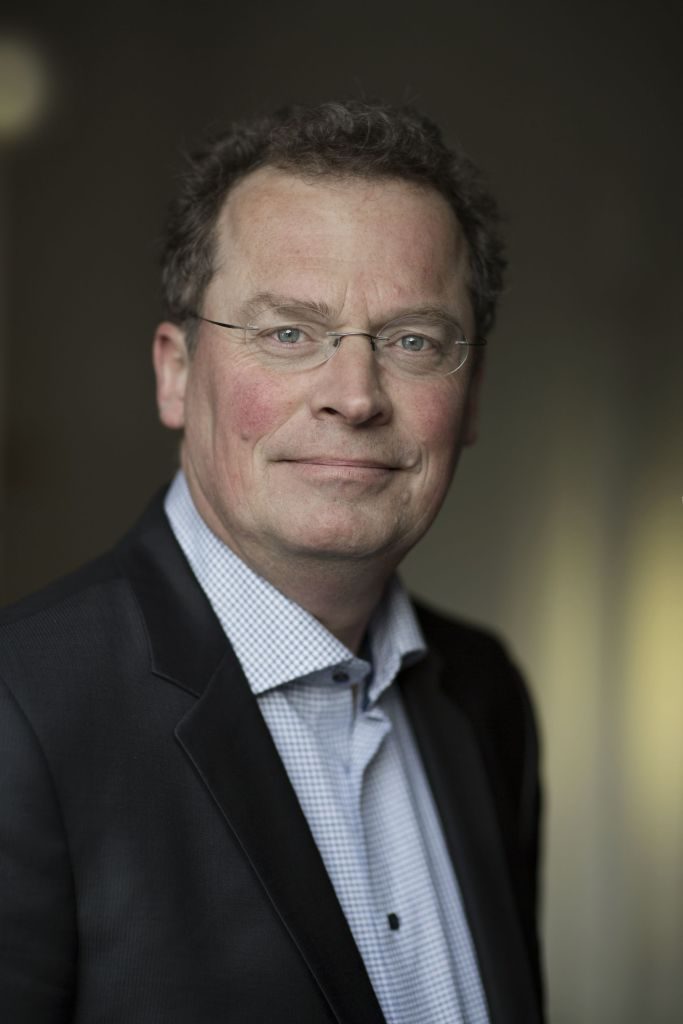By Sara Bartl and Joëlle Koorneef
We asked your questions to Dean Bert van den Brink. This is the second part of the interview (you can find Part I online at tr.rasa.nu).

Do you think it is possible for an institution to present a truly well-rounded education in all disciplines? We already talked about developing a new discipline. But more the core of liberal arts and sciences, what is your opinion about that?
Yes, that is possible and there are several possibilities. As most things in this world they all have their strengths and their relative weaknesses. I come from the world of philosophy. When I studied in the 80’s, what did I do? First, I did two years of theology, then God died. When you have theology and God dies, you are left with philosophy, so I continued with philosophy. And I basically did philosophy for the five years that followed, which would now be kind of a bachelor’s and a research master’s, it was all one thing at that time, “doctoraal” it was called. Did I do a lot of philosophy? I did an incredible lot of philosophy and I told myself, “now I want to read Hegel.” I did a couple of courses and then I did a lot of not-doing-courses but just sitting in the library and reading Hegel. Because I wanted to understand it – not sure if I succeeded in that. That was extremely focused just on philosophy and then after that I did four years of PhD in political philosophy and again it was all focused.
So, I myself did not have a liberal arts and sciences education at all. Was it a good education? I think it was a terrific education. Now go to a liberal arts and sciences program. When I defended my PhD, which was successful, I was not able to present, write, or act strategically in the world, as some graduates from UCR are, at the point where they have studied for just three years. I am flabbergasted by what you can do. I was at the Student Research Conference here and I saw Polina Bochenkova and Joost Verheggen and Abigail Pickard. And they did these one-minute pitches before winning their awards. It was immense. I couldn’t do it. And, you know, if you would have asked me to do it after three years of philosophy I would have been so clumsy! Because I would have started to sketch the problem, that would take me about 20 minutes. Although I was very young, this was this very old professorial style. And what you can do because of the rhetoric classes, because of the presentations in class, because of the constant debating and deliberating and working together and then breaking out of that and having to do something on your own, that brings a totally different form of well-rounded education to our graduates.
I would never say that the liberal arts and sciences way is the only way, because if you want to do philosophy and only philosophy, and if you want to do mathematics and only mathematics, and if you want to do even music and only music… go to the places that offer that. That is what you have to do. But if you want to do the depth and the breadth of an academic education, then this is the best kind of place to be. A truly well-rounded education. A truly well-rounded education.
Many students nowadays worry deeply about what it is that they will do with their undergraduate academic education. We see it in the national Student Evaluation, not just for UCR. Don’t worry. I cannot tell you – what’s your major?
Antiquity and Linguistics.
Okay, I cannot tell you what it is what you will do in ten years from now. What do you do?
Antiquity and Literature.
I cannot tell you. You may work at a bank. You may be an associate professor. You may be a museum director. I have no idea. Do I worry? Not for a minute. You will find your way. And actually, this is central to an academic education. And the more we give into folks who think that this should actually be kind of a professional education, the more we endanger what this place, or a program in pure mathematics, or a program in pure music, or a program in pure philosophy, is about. Don’t worry. A professor of mine in the 80’s said: “if you succeed in understanding Kant and Hegel, a policy paper will be not that difficult for you.” And that’s brilliant, that’s brilliant. That is deep trust in what an academic education can do for you, and that is how it works. So those who criticize our kind of places for not being practical or not being professional in their orientation, they really don’t get it. They don’t get it. As universities, we should unite against that trend. And for me it is easy to say because I have nothing to complain about when it comes to position, but really: don’t let yourself be frightened by it. The only thing we have to fear is fear itself.
Thank you for those reassuring words. You talked about sitting in a library and reading what felt important to you. At UCR, however, it is very difficult to make that space. Do you think that’s important, that we are lacking the possibility of taking some time for personal study at UCR?
That’s a very important question. Times have changed. I studied for seven years, which actually was quite quick at the time. Of course, summers at UCR are long, so you can do some reading, but many of you have to work, because life is expensive. I will be interested to see what our curriculum committee will come up with in regards to questions of organization of the semesters and organization also of courses and the size of courses, because I think that it wouldn’t necessarily be bad to build some bigger elements into the curriculum where people can actually get really deep. I was at Bard College, you saw it on Facebook maybe, and they have something there that I think they call “Senior Project”. I know that Dr. Luscombe is very enthusiastic about it, she will be back in a couple of weeks from Bard.
So a student has a project for a whole year in the final year they have supervision every two weeks I think, and they are just working on this one. They have a similar semester size, so in two times 15 weeks you can really do any project you want. That is the kind of thing that will probably give you this longer term space for development and I would be in favor of that, although we have to recognize that for the Humanities this could be quite ideal whereas I am not sure that it is for the Sciences, for instance. But why would we all have to be equal? We have to find forms that fit what happens here.
Next question we got: suppose one sees the UCR body as a currently sick one, how do you propose it could heal?
I don’t see UCR as a sick body. Let me stress that. And I don’t want to go with that metaphor. I am well aware that when I came in as a new Dean I opened up a public space for talking about what may be not ideal about the forms that we use in UCR. That has brought out some forces, I think, in the college that have focused very strongly on being critical. Now being critical always has two sides. Being critical has this side of trying to show what is not good, and the other side is doing that from deep interest and philosophically, I would actually say love, of the object that you can truly criticize. From that love, we want to make things even better. That is where the stress should be.
We are in a phase of re-thinking certain aspects of UCR and I think a place like UCR needs that, but we have to do that from this deep commitment to UCR. Do we need better wifi? Yes! Should the copying machines be better? Should student housing be better? Yes, of course. Is all that what this place is really about? No, it isn’t. The heart of UCR is the excellent quality of education. One thing I also worry about is student residences. We are on that. We are in constant contact not just with Woongoed and Villex, but also the city. We talked to the city and they have an influence on Woongoed and we have told them very clearly that some of the situations in the student residences are no longer acceptable. And that is very high on our list, not because I think that comfortable living is essential for academic learning, but I don’t want frustrations there. Basic is not a problem, but it has to be solid. And where it isn’t, it is unacceptable. That is a normative statement and we will keep pushing to make Villex and Woongoed deliver, because we have to.
That was a nice round of very heavy questions.
That is heavy question, yeah. But the good news is: such problems of facilities are much more easily solved than problems that you would have in the case that your academic program would not work.
Now for some more light-hearted questions that we got sent in. If you travel a lot, what’s your standard Kiosk order at the train station?
A cappuccino. Usually just a cappuccino. If I get tired I’ll take a Twix. And if I am in a really bad mood I will get liquorice and eat too much of it and feel bad and guilty about that.

Relatable. Do you like pineapple on pizza?
I hate pineapple on pizza. I have a Frank Zappa quote here: “Maybe you’ll go to Straw Hat Pizza / To get all those artificial ingredients / That never belonged on a pizza in the first place / (But the white people really like it…)” I think it was on his album Sheik Yerbouti. Shake your booty, but you write it as Sheik Yerbouti and it’s Frank Zappa with this sheik outfit – do you know that album cover? It’s fantastic, you have to Google it. It is a very problematic and sexist album but he is funny.
Frank Zappa and pizza are two connections I never made before, but thank you. What is your favourite introweek activity? If you see the students walking around in their colourful polos…
What is my favourite introweek activity…well, welcoming them to UCR! I mean, I really like to do that. And it may be a boring answer but I think that that is my favourite part.
Are you loyal to a particular football team?
No.
What is your favourite flavor of tea?
Yunnan Gold, that’s a Chinese black tea.
What’s the best fry place in Middelburg?
I have no idea. I eat fries… but I am not looking for the best place to eat fries, I have no idea. People told me there is some kind of kiosk that specializes in it, I think it is near de Lange Jan.
BT’je Anders!
I have never been there actually, but people tell me – I think professor Rijkers told me that is the best place!
So that is the news that travels along faculty and staff?
No, I once met him on the market and I said “hey Ger” and he said “I just tried to get the best fries in town but there were so many people there, that I am now forced to go to another place, to the second-best place.” And he seemed to know what the second-best place was, I was in full admiration of it!”

Which capital city would you advise UCR students to visit at least once in their life?
How many can I mention?
Top five?
Beijing, Lisbon, Rome, Madrid, Berlin. But now I forgot about London.
So, all of them?
Yes and no. Go to Beijing!
Thank you for your time, for the long questions that were very heavy in the hearts of students.
And in mine!
Sara Bartl, Class of 2019, is Linguistics and Antiquity major from Salzburg, Austria.
Joëlle Koorneef, Class of 2018, is a Literature and Antiquity major from Zwijndrecht, the Netherlands.

